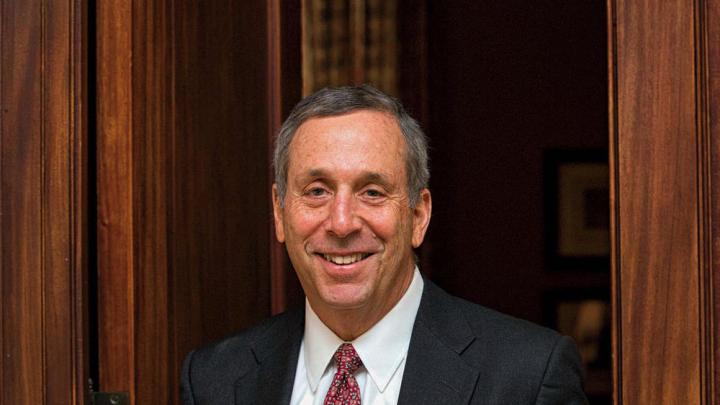F
all is always a lively time at a place like Harvard. Students are back, of course—some new and some returning. But there is another reason for the buzz of excitement around campus as the leaves start to turn and the evening air grows crisp. It is the season when many people across the University community wonder whether we will hear good news as the annual Nobel Prizes are announced. And this year, we did.
Two Harvard faculty members were honored in 2019, bringing the University’s total count of current or former Harvard faculty Nobel Laureates to 50. This year, Michael Kremer received the Nobel Prize in Economic Sciences—along with two MIT colleagues—for his innovative approach to alleviating global poverty, and William Kaelin—along with colleagues from the University of Oxford and Johns Hopkins University—received the Nobel Prize in Physiology or Medicine for his work on how cells regulate oxygen.
The Nobel Prizes recognize achievements that provide “the greatest benefit to humankind,” and it is easy to see the benefit in the work of our new Harvard Nobel Laureates. By using randomized controlled trials—experiments more commonly used in medicine—Kremer, the Gates Professor of Developing Societies in the Department of Economics, demonstrated far more effective means of delivering needed vaccines and treatment to impoverished children in the developing world. And Kaelin, the Sidney Farber Professor of Medicine at Harvard Medical School, has broken ground in our understanding of how cells, including tumor cells, adapt to changing oxygen levels. His research is already leading to new therapies for treating cancer.
Although focusing on very different problems, Kaelin and Kremer are both striving to benefit humankind through their research. The same can be said of the other 48 current and former Harvard faculty members recognized with Nobel Prizes in a variety of disciplines. And it can be said of the many members of our University community who apply their knowledge and dedication to the world’s most intractable problems every day.
But much of the scholarship pursued by our faculty and their students is not problem-focused. It is driven simply by curiosity. Often, this research leads to unexpected benefits for society years later. For example, a Harvard physicist refined a technique in 1949 to measure more effectively the frequencies of electromagnetic radiation absorbed by atoms and molecules. This technique ultimately led to the development of the atomic clock, a highly precise device to measure time, and would eventually win its creator, Norman Ramsey, the Nobel Prize in Physics. Ramsey’s curiosity-driven research profoundly changed our lives because it paved the way for other pioneering inventions like the Global Positioning System (GPS)—a technology that uses atomic clocks and is an essential part of modern life all over the world.
Profound, life-changing scholarship does not happen just in the natural and applied sciences and engineering. Our faculty in the social sciences, arts and humanities, and our professional schools are discovering, challenging, creating, and inventing as well. In every realm of scholarship represented in our 12 schools, our faculty are pushing the boundaries of knowledge. They are asking deep questions about both the origin of life and the meaning of life. They are seeking to simulate intelligence computationally while they are also examining the ethics of artificial intelligence. They are producing great literature and music while trying to understand how the brain encodes language and sound.
At a time when people are questioning the value of higher education and the role of research and scholarship in policymaking, we must understand why it is important to continue to support this work broadly. “Nobel Prize season” is a reminder of the power that universities have to illuminate the world, transform the way we live, and provide “the greatest benefit to humankind.”








